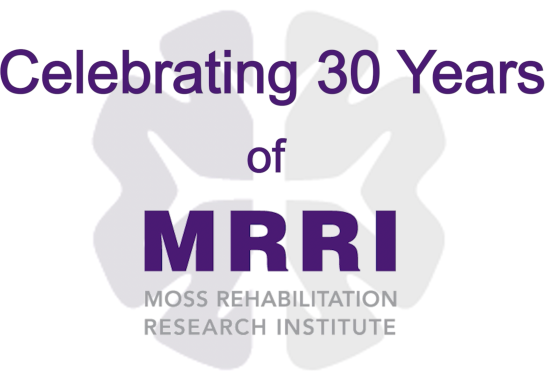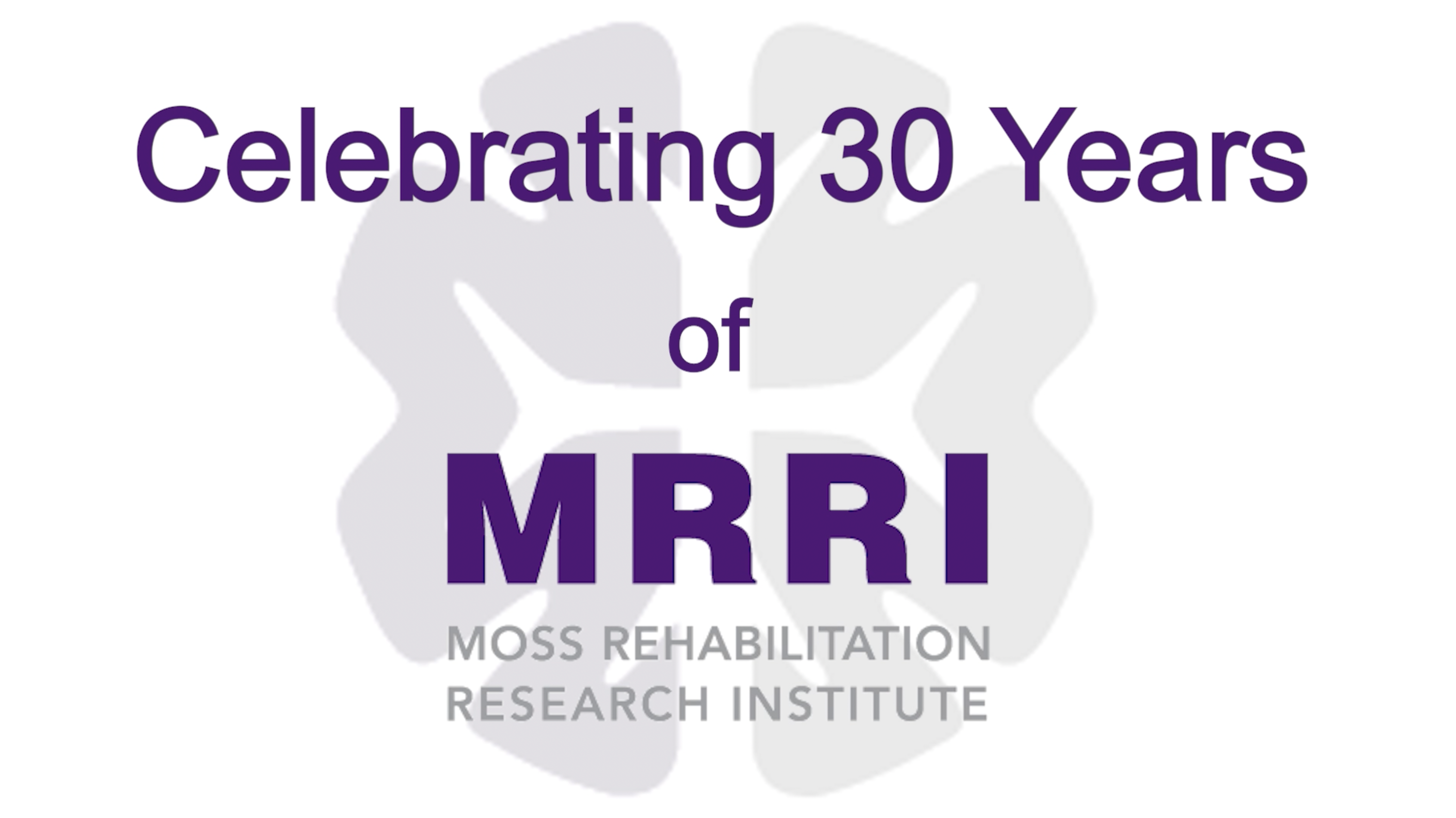Over the past three decades, research at Moss Rehabilitation Research Institute (MRRI) has changed clinical practice in neurorehabilitation, advanced our understanding of the relationships between brain structure and function, and eased the burden of disease from neurological conditions worldwide. As the Institute celebrates its 30th anniversary this year, it is exciting to reflect on how MRRI came to be and its many accomplishments.
In the 1960s and 1970s, MossRehab had a substantial research portfolio in collaboration with Temple and Drexel Universities as part of a Rehabilitation Engineering Center supported by the National Institute of Handicap Research. However, research funding at MossRehab declined in the 1980s. At that time, Nathaniel Mayer, MD, Director of the Drucker Brain Injury Center, met Myrna Schwartz, PhD. Dr. Schwartz, a cognitive neuropsychologist, spent time at Moss learning about rehabilitation in a clinical setting and the real-world clinical problems experienced by patients with stroke and traumatic brain injury (TBI).
She accepted a research position at the hospital in 1986, and she began studying the many errors in everyday actions that patients with brain injury exhibit. Within a few years, Drs. Mayer and Schwartz, along with Steve Braverman (then Director of Development at Moss), developed a plan to create a research institute at MossRehab with the goal of building a larger research program. Mr. Braverman secured the initial support for the Institute from former MossRehab CEO Sy Schlossman and the Board of the Hospital.
Drs. Mayer and Schwartz were keen to further build their team of talented rehabilitation researchers, and John Whyte, MD, PhD, was recruited to Moss in 1989. Dr. Whyte had completed his PhD under the supervision of Dr. Schwartz, and he had gone on to receive medical residency training in Physical Medicine and Rehabilitation, specializing in TBI. Upon accepting a position at MossRehab, Dr. Whyte began developing his own independent research program and serving as an attending physician in the hospital.
Drs. Whyte and Schwartz were appointed as Director and Associate Director, respectively of MRRI in 1991. They developed a strategic plan proposing research programs in cognitive neuroscience/cognitive rehabilitation; movement science/mobility rehabilitation; and rehabilitation outcomes and quality. In developing their business plan in consultation with directors of other research institutes, they identified a need for philanthropic support to cover the anticipated expenses. The MossRehab Board identified research as essential to the institutional mission, and the Board voted in 1992 to approve the proposed plan and begin fundraising. Thus, the Moss Rehabilitation Research Institute was officially established.
MossRehab underwent a merger with Einstein Medical Center to become the Einstein Healthcare Network shortly afterwards. To ensure the future of the new research institute, funds were earmarked for MRRI from donations to support MossRehab and MRRI.
Over the next several years, promising early-career researchers in the MossRehab community were mentored and subsequently hired for permanent research positions. These included Laurel Buxbaum, PsyD, who received a postdoctoral fellowship to train with Dr. Schwartz, and Tessa Hart, PhD, who came to Moss to work in a clinical role at the Drucker Brain Injury Center. Dr. Buxbaum went on to be hired as an Institute Scientist and now serves as MRRI’s Associate Director. Dr. Hart served as Principal Investigator of the MossRehab Traumatic Brain Injury Model System from 2002 to 2018, and she is now an Institute Scientist Emerita. These scientists, along with Drs. Whyte and Schwartz were instrumental in establishing MRRI’s reputation as a leader in translational research in the field of neurorehabilitation.
MRRI continued to recruit highly qualified scientists in the area of cognition and psychology, but there was a gap to be filled in the area of movement science. In 2003, Drs. Whyte and Schwartz began advocating for enlarging the endowment to recruit a critical mass of movement scientists. With the support of Barry Freedman (former CEO of Einstein Healthcare Network), Ruth Lefton (MossRehab COO) and Alberto Esquenazi, MD (Chairman of PM&R at Einstein Healthcare Network), and the Development Office, funds were secured to begin recruiting movement scientists. Drs. Schwartz and Dr. Whyte transitioned to Institute Scientists Emeriti status in 2016 and 2018, respectively.
Dr. Buxbaum assumed the role of Associate Director in 2016. In 2018, Dylan Edwards, PhD, joined MRRI as Director, and the Institute continues to grow and make important contributions to translational neurorehabilitation research. MRRI is proud of its many achievements, including:
- Moss Traumatic Brain Injury Model System funded continuously since 1997
- MRRI Research Registry with over 2,000 potential research participants
- T32 Postdoctoral Training Grant with the University of Pennsylvania funded since 2013
- Contributions to the development of the Rehabilitation Treatment Specification System
- Development of numerous tests, technologies, and resources for clinical and research use
- MossRehab Aphasia Center which has provided people with aphasia and their families with critical services and opportunities to participate in research for over 25 years
- Klein Family Parkinson’s Disease Rehabilitation Center established at MossRehab in 2019 to integrate research with innovative rehabilitative therapies that support patients’ quality of life and keep people with Parkinson’s active in their daily lives.
- Contributed key research on assessment, treatment, and policy advocacy related to disorders of consciousness
- Substantial research contributions to the fields of neuroscience and neurorehabilitation, spanning from theory to practice across multiple domains of human function.
The Institute currently has ten laboratories and programs, and MRRI scientists have exceptional track records of research funding from NIH, other government grant programs, foundations, and other sources. The bridge between contemporary clinical practice at MossRehab (ranked among the nation’s best by U.S. News and World Report for the past 29 years) and the ground-breaking translational research continues to be a key strength at MRRI and serves to attract clinicians working at MossRehab as collaborators. In 2021, Einstein Healthcare Network and Jefferson Health finalized a merger that brought these two outstanding organizations together and provided even more opportunities for MRRI to grow and continue its legacy of research excellence.



4 comment on “30 Years of MRRI: A Look at the Institute’s Founding and History”